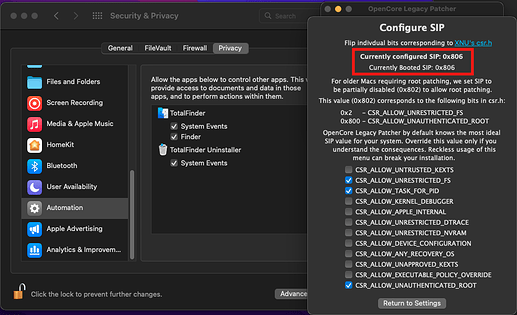@Welaxxx This is probably out of scope for TotalFinder, but I will take this into consideration.
Hmn… interesting. I will have to find some time and install OpenCore on some spare hardware I have to test further.
Having CSR_ALLOW_TASK_FOR_PID and CSR_ALLOW_UNRESTRICTED_FS disabled is sufficient for real Mac hardware, at least on a 2015 MacBook Pro running every relevant version I use for testing TotalFinder (12.5b4, as well as 12.4, 11.6.5, 10.15.7, and even 10.14.6 as reference).
It’s possible that OpenCore may behave differently in some minor way that is causing it to not quite work correctly on your system.
… It is odd though, I definitely recall some other people were able to get TotalFinder to run on OpenCore having at least those two SIP flags disabled.
@Ssiswent @Ken I’ve gotten TotalFinder to work on macOS 13, but there are a few issues with the current public release, including the fact that enabling the Coloured Labels feature will cause Finder to crash (due to Apple refactoring some portion of Finder, as they often do).
That being said… I’m quite surprised that both of you have reported injection issues on macOS 13, as from my testing, the current public release actually does work mostly fine on macOS 13 (aside from the aforementioned Coloured Labels crash).
There is something of note that I noticed though, but from my understanding, it should only affect virtualised copies of macOS (on Apple Silicon), not when you’re running it on bare metal.
Basically, in order for TotalFinder to successfully inject into a virtualised copy of macOS 13, I had to add the -arm64e_preview_abi boot-arg, otherwise the injector would always return error -1708 (errAEEventNotHandled), which causes (or is one possible cause) of the infamous “Apple Events cannot be delivered.” message.
So, this is a very “might as well try it in case this somehow makes it work, I guess” suggestion, but perhaps try running sudo nvram boot-args="-arm64e_preview_abi" in a macOS 13 Terminal session, and rebooting.
If this somehow makes TotalFinder work on your bare-metal macOS 13 installation, I… will have to look further into what is happening.
(And if you’re running macOS 13 in a VM like I am… well. There’s your solution! ;P)
※ Note: If you’re getting an error while trying to set your boot-args, you’re probably running a partially-enabled SIP configuration. You’ll have to add --without nvram to your csrutil invocation to disable NVRAM protections. Or if you’re lazy / don’t want to think about it, you can just fully disable SIP using csrutil disable.
Also, one last thing…!
On the off chance that someone reading this thread is trying to virtualise macOS 13 on a macOS 12 host and is running into an error while trying to perform first-time restore-install (with error AMRestorePerformRestoreModeRestoreWithError == 10), please refer to my tweet thread for how to fix this.
tl;dr: Apple kind of… made an oversight on how Virtualisation.framework works and its relation to MobileDevice.framework. To fix this, just run Xcode 14 at least once, so you get the new, out-of-band MobileDevice.framework (with macOS 13 support) installed on your system. You can safely forget about Xcode 14 and let it collect dust afterwards, if you would like.

